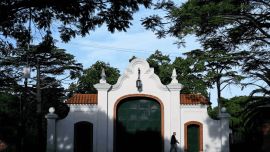Citizen insecurity, the flow of cash from organised crime activities and how they threaten Latin American democracies south of the Río Grande were among the topics analysed in the bilateral meeting between Paraguay President Santiago Peña and Argentina’s President Javier Milei earlier this month.
During the meeting at the Casa Rosada, in Buenos Aires, Milei’s government took note of the bilateral approach to the issues deployed by the governments of Peña, 45 and veteran Brazilian President Luis Inácio Lula da Silva, 78.
Despite their different political ideas – Peña being a liberal politician from the ranks of the traditional Colorado party, and Lula being as one of the creators of the socialist-leaning São Paulo Forum – the leaders of Paraguay and Brazil have agreed on the need to pool military resources to fight against organised crime and, within the wide category of unlawful acts, move against drug-dealing.
During their talks on February 14, Peña provided Milei with details of a recent joint operation by the Paraguayan and Brazilian armies to combat organised crime. It included the mobilisation of troops in the departments of Alto Paraná and Canindeyú in Paraguay, and the states of Paraná and Mato Grosso do Sul in Brazil,.
Paraguay’s Defence Minister General Oscar González recently staged a press conference to review the results of operation ‘Basalto I 2024,’ which ended in the seizure of drugs and resources of drug-dealing gangs to the tune of nearly US$19 million.
Mato Grosso and Alto Paraná are areas of significant criminal conflict. More than 100 firearms were seized, 102,688 missing ammunition shells detected and seven security companies operating irregularly were uncovered.
The blow to drug- dealing clans involved the discovery of 630,303 kilos of marihuana across 33 drug dealing camps. They were destroyed, while 28 people were arrested.
González claimed that the Brazilian and Paraguayan armies joining forces to fight against organised crime will not be a one-time occurrence, but rather that “operations will continue throughout the area.”
“There was a positive result in a coordinated and joint operation: coordinated with Brazilian troops and joint because not only was it conducted with the different branches of the army, but also with operations by the National Police and other State institutions.
“This will be the first of several upcoming similar operations,” he added.
Previous articles warned about the challenges faced by Paraguay in terms of the actions of its bloody drug-cartels. The nation received a very poor rating in a transnational global organised crime index, finishing fourth after Myanmar, Colombia and Mexico.
Paraguay’s geographic position makes it appealing for organised crime management to settle there to export and smuggle to third-party nations.
Located between Brazil and Argentina – the two South American countries with the greatest consumption of drugs – and neighbouring one of the fastest-growing narcotics production centres in the American subcontinent, Bolivia, organised crime bosses decided to settle in Paraguay and take it over, benefitting from the corruption found at all levels of power.
In this context of “hot borders,” Milei’s Argentina is continuing to assess whether to deploy its armed forces to fight terrorism and organised crime. According to Defence Minister Luis Petri, only a presidential decree would need to be issued changing existing rules.
Petri recently pointed out the need to modify the decree regulating the Defence Law and publicly stated: “Modifying the decree, not the Defence Law, the decree regulating the Defence Law to expand military capability, so that our Armed Forces, for instance, may act not only against external aggressions from another State, conventional aggressions, but that they may also act against external aggressions whether or not they come from another State.”
He continued: “For instance, terrorist aggressions, which is no longer argued in the world. We see it in Israel, where on October 7 the country suffered a brutal attack by Hamas and its Armed Forces acted immediately.”
Once the so-called “omnibus bill” foundered, Argentina’s Defence Ministry told the Noticias Argentinas news agency that officials are working on a bill that would help expand the tasks of military officers, in addition to recommending to the president the review of the decree regulating the Defence Law.
by Antonio D'Eramo, Noticias Argentinas




















Comments